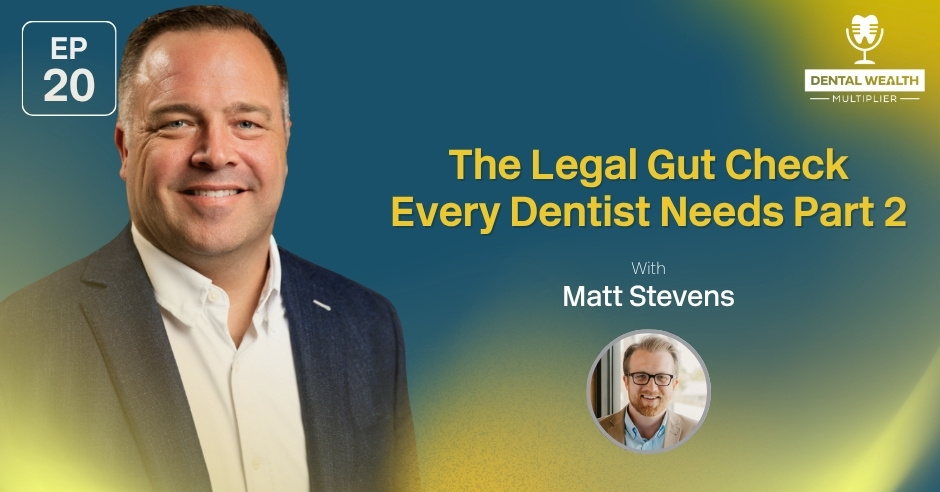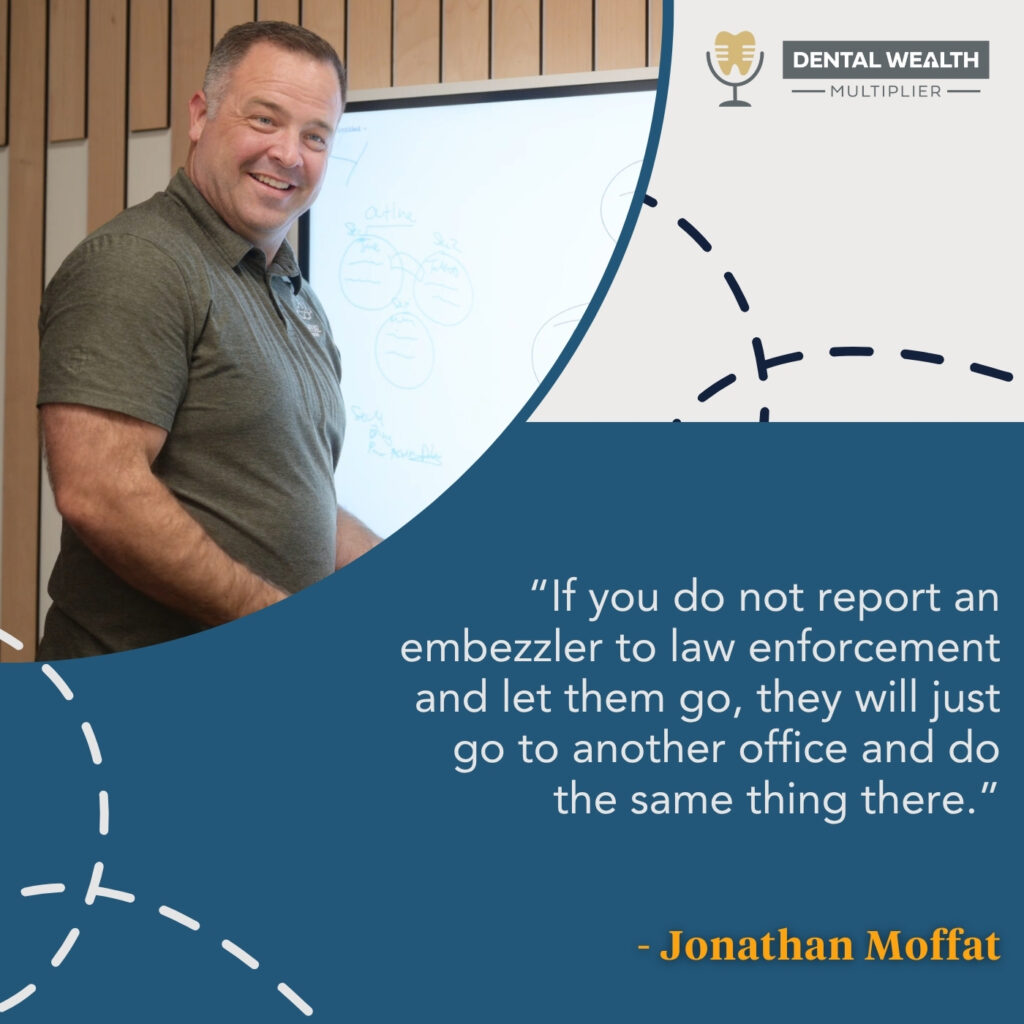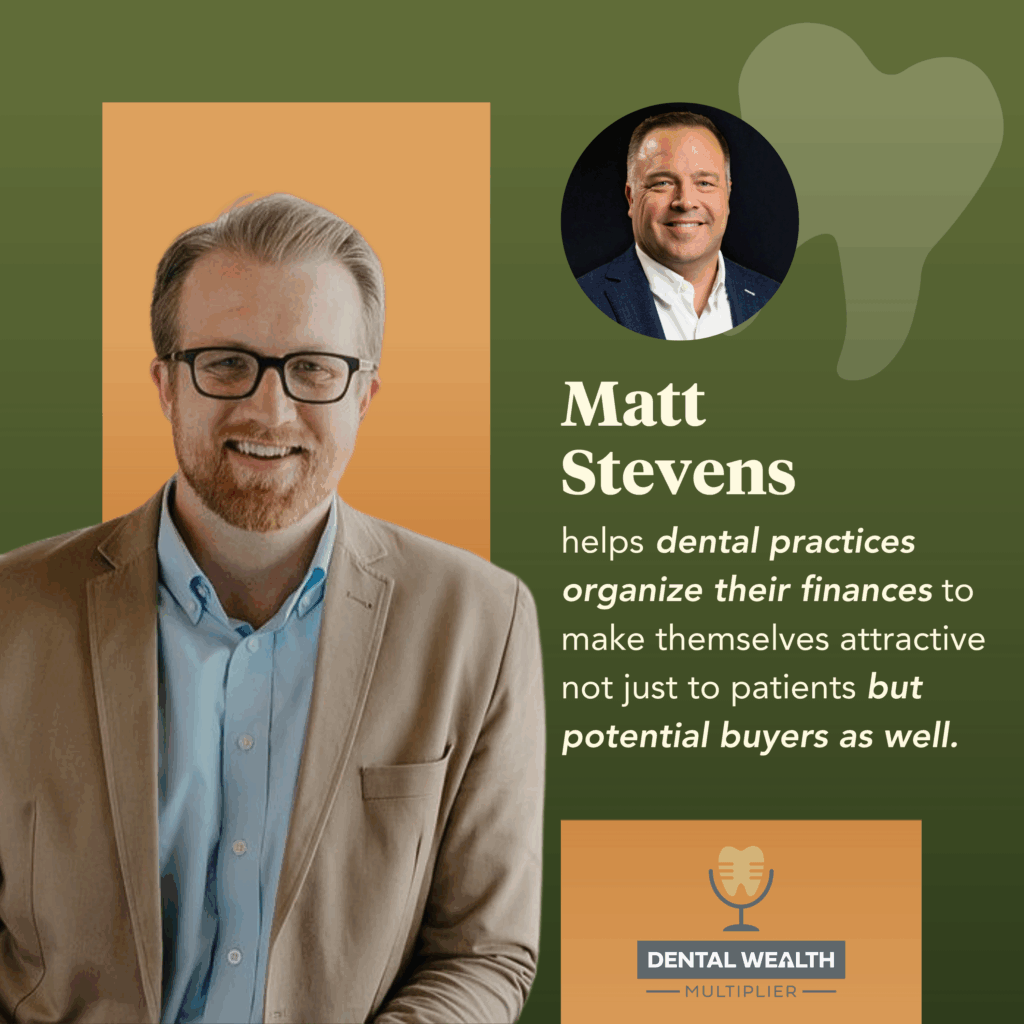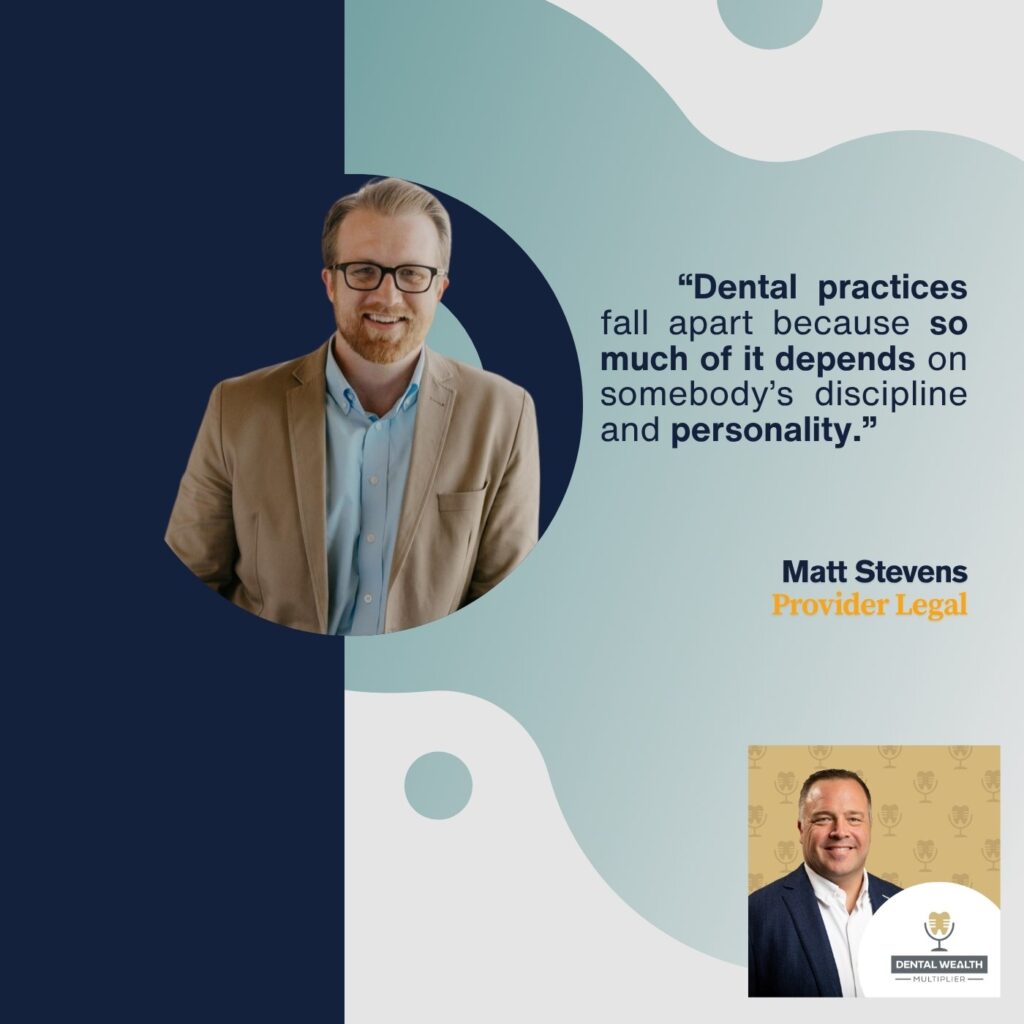
In this part 2 episode of Dental Wealth Multiplier, Jonathan Moffat and Matt Stevens continue their discussion about the importance of doing a legal gut check in your dental practice. Tune in as they dive deeper into the legal realities of growing a dental group and what shifts as you scale. From embezzlement risks and systems breakdowns to what DSOs really care about during due diligence, Matt lays out the legal mindset you need when moving from one location to many. They also unpack what makes or breaks a DSO deal, how to avoid being seen as a disorganized seller, and why being prepared opens doors beyond just the sale.
Find Jonathan at jonathanmoffat.com
Learn more about Provider Legal at providerlegal.com
Connect with Matt Stevens on LinkedIn: https://www.linkedin.com/in/matthew-stevens-19a5258/
Find Jonathan on LinkedIn: linkedin.com/in/jonathanmoffat1
Get the full library and stay in the loop at dentalwealthmultiplier.com
—
Watch the episode here
Listen to the podcast here
The Legal Gut Check Every Dentist Needs With Matt Stevens Part 2
How To Deal With Embezzlement
I’ve shared here that I started my career working with my dad in the financial services industry. I’ll never forget we’re in Florida. I’m in San Diego, but we’re in Florida, and my dad is talking. I’ll never forget. I was 21 or maybe 22 and probably still in college. We’re sitting there, and my dad saw this guy. He’s like, “What are you guys doing for client acquisition? How are you guys getting clients?” The guy was like, “I’m not going to tell you that. You’re my competitor.” My dad was like, “You’re in North Carolina. I’m in San Diego.” This is in the early 2000s.
It was like, “I have my walls up. I’m not sharing.” I do feel like, to your point, in this industry, people are a lot more willing to share. There’s a lot more community. There’s this feeling I want. I get that they were business owners who want to be successful, but I also want to help other people be successful. That doctor, I found out he was talking to our client or our people. I was like, “I want you to be successful. I’m happy to help provide some resources for you, but you can’t take our employees.” There’s a whole other issue there.
Also, something to consider, not to hammer on the embezzlement piece, but it’s something you need to think of. If you’re not reporting that person to law enforcement, but you let them go. They’re going to go to another office and do the same thing there. We have a guy who has come on the show a couple of times. This is his main business, finding embezzlement. He says it all the time.

He’s like, “What we find out is when the person has finally reported to the police and the police do the investigation, it’s generally the 4th or 5th office that person has worked at and embezzled from the time until they are turned in,” which is crazy. If you think of this as you’re a part of a community, and you care about the dental community, you would report those things to law enforcement so that they cannot turn around and go two doors down and do it to your buddy or your neighbor down the street.
I have two things to say about that. One, it’s surprising to hear, but after hearing it, you’re like, “That makes sense. They do it once. Of course, they’re going to do it again.” They are never great employees. They are always somebody who talks a great game. Whenever I get embezzlement issues that come up, yes, there’s the investment, but then it’s 6 to 9 months of cleanup because in order to get the embezzlement, they have to hide a bunch of stuff and redo your systems.

As you speak about growth, like the need for the systems to be consistent so that you can catch it as it’s happening, it’s such an important feature. Probably the second part is when you speak about that guy who was like, “No, I’m not going to tell you how I find clients because you’re your potential competitor,” that speaks back to how you pick vendors and partners. I only like working with other people who see the market as “There are plenty of businesses for everybody. This is not a zero-sum game because I didn’t take something off your plate.”
The mentality is wrong. It’s factually incorrect. It feels gross inside. I don’t mess with those people, and I’d say, “If you’re going to pick vendors, that feeling of what feels gross is probably because it violates your values.” Figure out what your values are, particularly your economic values, or how you approach the market values. Those are like, “Who do you like working with and why?”
How To Start Your Next Practices
I appreciate that. We talked about the guys starting their practice. What changes or what’s different? Now, you’ve got a doctor who comes and goes, “Matt, I’m looking at buying my third, fourth, fifth, or eighth practice?” How did your advice shift? How does your role with those individuals shift in what you’re telling them?
There are two main areas that I like talking about with those people. First off, what is it you’re trying to do? What is it that you want? Are you trying to grow, lead offices, and keep them? Are you trying to grow and sell? What are your goals? That’s the first biggest piece, and then sub to that is, how are you getting their meeting? You’ve already done this successfully before. Is it because you’re a specialist and you think, “There’s this big gap in the market. That specialty is done wrong within this area, and I’m going to do it correctly.”
Is it, “No. I buy distress practices and I clip them around. That’s what I’m good at?” What is your viewpoint, because the viewpoint of what it is that you’re accomplishing will serve what the goal is. Those are the first two things I like to get figured out as much as I can. The second piece is it should be here now. You’re going to help manage issues. Who is your office manager? That size, your office manager is the head person, I’m envisioning. He’s going to end up doing all of your HR stuff and doing all of your terminations. Who is that person, and have you invested in that person?
That’s the one that, like a lot of your life, is going to be dependent on whether they do a good job or not. The second piece is, what systems do you have? Do you keep everything consistent as quickly as possible? The more systems that you have that are done well, that means fewer problems I have to deal with attorneys, as a whole. They’re going to come up. That’s okay that they come up, but you’ll have a lot fewer of them if you have those systems in place in terms of how you interact with clients, collect money, and what that looks like, essentially.
This last intersection depends on your goal. If you’re selling to a DSO, be aware that it’s a different transaction altogether. All these transactions that you’ve done before are licensee-to-licensee. The tone, the tenor, and the issues that come up are very different than when you’re going into a DSO. If you’re going to a DSO, they have different interests. Their goals may or may not align with yours, and what they expect to see to do a deal is very different from what a licensee expects. Be prepared for that. You’ve got to study up on that and make sure that you’re organized because it’s not the first. If a DSL wants your practices, they’re going to go because they’re going to pay enough money to do it.
The cost of not being organized, in my opinion, isn’t the price of your first practice. It’s the willingness of that DSO to do a second, third, or fourth deal, if that’s what you’re trying to do, or within that community, are you noticing like, “I’m the only guy that knows what he’s doing. I know how to do this transaction.” I make this player within this space. Therefore, you’re willing to get multiple deals. The funny part about entrepreneurship, for me, I always wanted to be wealthy enough to get past that first rule. You’re from San Diego, so you’re going to San Clemente, and it’s $1.8 million to resell in the San Clemente area.
The cost of not being organized is not the price of your first dental practice. It is the willingness of the DSO to do a second field or more. Share on XOne bedroom and one bath condo.
Trust me. I’m sure my market knowledge is rusty, but let’s say between $1.8 million and $2.2 million. You’re fighting with everybody. Once you get to $2.8 million to $3.2 million, all of a sudden, there’s like 1,000 more square feet. The realtor calls you back and is like, “Here’s you’re glass of champagne.” I want to get to that level of wealth, whatever that happens to be. The same applies to dental, like your first practice. The stuff you will have to do to get to one to three practices is hard.
It’s also 75% of the work. Twenty-five percent of the work is getting to that 3 to 10 because you have learned so many lessons on 1 to 3. What I’m arguing for and what I’m saying is, “If you do this last 30% well, you can recycle this so much faster and do that very well if you spend the time to get educated on that other piece.” That’s why picking good advisors is critical because you’re right at the point. That’s why practices can fall apart, because so much of it depends on somebody’s discipline, personality, and what decisions they make, and they are listening to anyone.

What To Consider When Working With DSOs
When you’ve advised people through, are there generally some red flags, or would you say, “Look out for or be aware of this when you go through a transaction with the DSO?” As you represented clients through those transactions, you made a good point. We talked about this too. If your financials and legal documents aren’t organized, they’re going to be asking you for everything. If you show up organized, there’s something called Q of E. When they go through their Q of E, or quality of earnings. It’s what that stands for.
They’re verifying like, “We gave you this offer of what we said your practice is worth. Now I have to go verify that’s what your practice is worth.” The more unorganized you are, the more you’re like, “I think I have that lease somewhere. Let me try and find it. This is an old expired insurance policy or whatever.” The more they’re like, “What else are we walking into that is going to be a nightmare?” It could decrease what that offer is based on. What have you seen in terms of if you’re looking at approaching or you’re being a coach by a DSO, which a lot of people reading this episode are, you need to be aware of X?
There are a lot of different ways to answer that question. Understand that my answer is automatically going to be limited and very basic to how length of a discussion with any particular person. Here are a few key things that I look for. One is, has the DSO decided on a model? They have a viewpoint that they’re saying, for instance, “I have this new procedure I’m going to do that’s going to be a value add to every practice I have. I specifically want to target dentists who have been out for five years but less than fifteen because I needed to stay on.”
They have this whole viewpoint and this whole story of how they’re going to approach the market. How much of that do they tell you? Can I get as much of that out of them as possible? In theory, they should be real to tell you about it because this is their baby and their idea, and they want you to be a part of their idea. If they’re open about that and are very clear about their goals and objectives in how they want to accomplish that, and how you guys fit together, I always find that to be a great sign.
I especially find that to be a great sign if this is the fifteenth deal they’ve done, because then, it’s like, everyone can have an idea. If they’ve done it 3 or 4 times, and then you have an idea to figure out. Something with that level of experience. Someone with a viewpoint in the market who will talk with you about their goals of how it is that they are matching them. That’s one big category. The other big category is, how do you, as a dental office, prepare to have a DSO sale?
Every time I say this, I have a neighbor of mine who works for a massive Fortune 20 something company. They do tons of acquisitions, and he’s on their due diligence team. They don’t do a billion-dollar deal a year, at least. They’re not spending at least that much money on a single meal. They get a little bit and make a lot. $100 billion is too small. It’s annoying, but he does all their due diligence. What I’m talking about is due diligence. There is a guy within the DSO. That is that guy. There’s always that guy who asks to know, does the rubber meet the road?
The easier you make their job by having everything organized, meaning, “This is my entity setup. This is how all my entities are relevant. You want my employment contracts, great. Here are my key employee contracts, offer letters, financial data, or whatever it is that they’re looking for.” The easier it makes that guy’s job, it means the less hesitancy the DSO has, which means your deal will go through a lot faster. If somebody has a reduction in price because you’re not organized, you should consider whether or not you should even do this deal because you damage the relationship to such an extent that they’re like, “This asset is very good. I’m not sure about the guy, but the assets are great. We want to be an asset.”
Make the job of the person who handles due diligence easier to lessen the hesitancy on the DSO's part, allowing your deal to go through a lot faster. Share on XYou always want them to be excited about the asset that you built and working with you if you’re going to continue to work with them, and that’s their model. My point in saying that is that if you’ve got a reduced price, that’s not even a red flag. That’s like you messed this up. Again, that’s the organization being able to show everything, to show your work essentially like 7th-grade Algebra. How did you get here? Show me how you get here? If you can do that quickly and easily, I don’t know that you’re going to get more money, but you’re going to get those second, third, and fourth transactions a lot. DSOs are always looking for good partners because they can identify assets a lot.
The tricky part is that they know they have to partner with dentists who understand the business side of it or are organized enough to be a business person. They will find other things for you to do. I’m always surprised, but once you find somebody good, you have no idea where one conversation can happen. I had lunch one time in the middle of nowhere in Central California. This big Texan salesperson walks in, about 60. The image that you have in your head, Jonathan, that’s it. The very stereotype you can think of is true.
He told me something I found very interesting. He’s like, “You never know the next conversation could lead to the deal of your life.” That’s my point. As you’re selling to DSO, there’s the asset and the person. If you can do the person, maybe you have no idea what that’s going to spin into, and careers are so interesting in medicine and dental in particular. You have no idea what that’s going to spin up to. There are tons of opportunities, and that is hard to quantify. There’s a sale to the DSO, but if you don’t do it well, you’re sacrificing whatever that path might end up being. That could be a cool path. You just don’t know until you go through and do it.
Importance Of A Correct Cash Flow
This is a nice recap of everything we’ve talked about, like organization and the team. Having a team around you that understands the marketplace, because they can advise you through that transaction. They can advise you before making the decision for that transaction that if you do X, Y, and Z, you’re going to look more attractive to the people who are going to be looking at you. All that buttoned up and tightened together. Being organized is something that’s a core value for us. A lot of advice we tell our clients, or one of our rules, one of our value propositions for our clients, we get their entire financial house in order and keep it that way forever. That’s our proposition.
I know from a legal standpoint, you’re telling them to do the same thing and helping them get organized and stay organized. The last thing you want to do is when you get a notification in the mail, and you’re being sued or have an employee complaint. You sit there and wonder, “Do I have the right insurance? Did I have the right agreement? Do I know where they are? Who do I contact?” You just add to the stress.
You are going to deal with those by being in business, and those things will happen. I like to sit here and say they won’t, but the reality isn’t. It seems like it’s getting more and more. You are going to deal with that. What takes the edge and the stress off of that is knowing I’ve got the right team in place that’s got my back. I’ve got my other areas covered with proper agreements. They’re organized.” All those points you’re talking about make a lot of sense and are going to hopefully help the clients and the doctors reading this feel like they’re covered.
In the event that something does happen, at least they know they have the right team. They got the right contracts and know where they are. Everything is up to date. Unfortunately, especially in my state, it doesn’t necessarily mean that you’re not going to still end up writing a check. Hopefully, it deters a few people, and the checks are smaller than what you maybe would have had to write otherwise.
I hear your thoughts. I appreciate that and I agree. Seeing your finances in order and keeping them there for everyone feels so good to hear. On an emotional level, I’m like, “Oh.” If you have that part of it, you can withstand so much if you have appropriate finances and correct cashflow. It’s a necessary thing to have. For my industry, the way that it’s a little bit different is I can’t tell you when it’s going to rain. No one can tell you all the different ways. Have I protected myself from everything that can go wrong? No, and you’ll never do that.
That is never the goal. The goal isn’t, “I’m going to do everything so nothing bad can happen.” The goal is, “That stuff is going to happen. I want to lower its weight. I want to lower the cost of it, and I want to have a procedure or resources in place so that when it does happen, I’ve got them.” That’s the most a law firm can do for you. It’s to say, “Here’s the umbrella. When it’s bad, we will help you figure it out. We’re going to set this up”, meaning we’re going to have the appropriate contracts in place. We’re going to update them when we need to. We’re going to update your handbook.
We’re going to keep you current so that when something bad does happen, it’s heck of a lot easier. It’s like arbitration. There were some decisions around arbitration, and finally, California settled, “We can have our arbitration clauses. That’s what’s happening.” That’s a heck of a lot easier. I can’t tell you whether or not you’ve hired a crazy employee. I can make it a lot easier if I can put this clause in your contract.
Be Comfortable With Mistakes And Start Now
Matt, any parting words of wisdom for our readers as we wrap up?
More than anything, what we’ve been talking about is just to start. You’re going to make the mistakes anyway. The mistakes are going to happen, and the bad things are going to happen, but the sooner you start, the sooner you get those mistakes out of the way and done. You’re doing it when you’re younger and have more energy, and when you don’t need as much money. Three or four kids later, it is more expensive.
Mistakes will certainly happen. But the sooner you start, the sooner you get those mistakes out of the way since you are still younger. Share on XEverything is more expensive. You have less time, fewer resources, and you’re going to make your mistakes on a smaller scale. When you get to that bigger stage, you’ve already set yourself up very well. The chances of success in dentistry financially to achieve the true financial and time freedom that you want, it might be the best industry for somebody who didn’t have money to do extraordinarily well for themselves. Arguably, that’s at least in the top ten. You can raise your chances of that by starting as quickly as possible after you get out of school. Whatever stage you’re at, start. I don’t care if you’re 40 or 50 or 22. Just start.
Get In Touch With Matt
Hopefully, by surrounding yourself with a team of experts in your field, you’ll mitigate those mistakes and have fewer of them, and fewer of them that are costly. Matt, thanks again for being here. Thank you to the Provider Legal team for sponsoring our upcoming Dental Wealth Mastermind. That’s going to be September 12th and 13th, 2025, in Newport Beach, California. If you want to learn more about what Matt and Provider Legal do, you can go to ProviderLegal.com. If you want to join us in Newport Beach in September 2025, it’s going to be an amazing event. Head over to DentalWealthMastermind.com. Matt, any other way you want people to get in touch with you, or better way to get in touch with you other than going to your website?
Shoot us a call. Our number is on our website. It’s at (714) 208-7097, Monday to Friday. We work 8:30 to 9:30 EST. We’re available all the time. Jump on the phone and give us a call. We want to talk with you. The first consultation is always free. I love talking anyway. I do have to make money, but I probably do a big chunk of this for free because I enjoy that entrepreneurial journey, particularly within this space. It’s a fun place to be. It’s extraordinarily rewarding for clients. Give us a call if you want to talk.
We appreciate you and the clients, our clients whom you and your firm have served and done a great job for. I appreciate you being here and looking forward to being with you in September 2025. Matt, thanks again for your time and for sharing your expertise and knowledge. To everyone else, thanks for tuning in.
It’s been my pleasure. Thank you.
Important Links
- Matt Stevens on LinkedIn
- Provider Legal
- Dental Wealth Mastermind
- Jonathan Moffat
- Jonathan Moffat on LinkedIn
About Matt Stevens
 Matt Stevens is the founder of Provider Legal, a law firm focused on protecting dentists and healthcare providers. He started his career as in-house counsel for a specialty dental group facing a major fraud investigation, and later held legal roles across multi-clinic healthcare organizations.
Matt Stevens is the founder of Provider Legal, a law firm focused on protecting dentists and healthcare providers. He started his career as in-house counsel for a specialty dental group facing a major fraud investigation, and later held legal roles across multi-clinic healthcare organizations.
After seeing how often providers were left unprotected, he launched Provider Legal to give doctors the legal support they need to grow their practices, protect their autonomy, and make smart business decisions in a changing industry.
